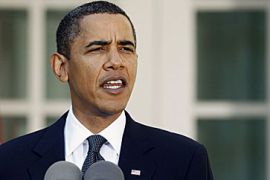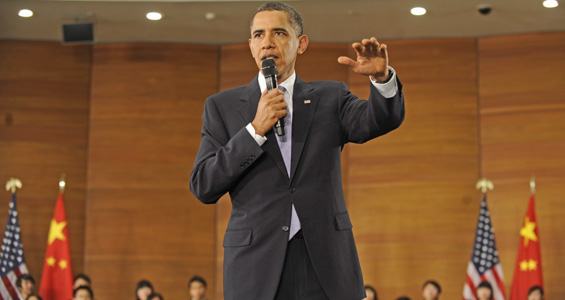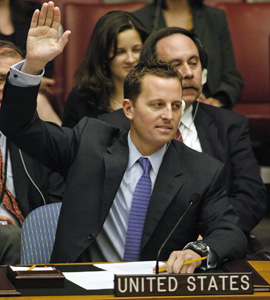‘Obama should speak to Al Jazeera’
Former US spokesman for UN mission says president should not shun best outlet to Arabs.

 |
| The Obama administration should engage the Arab public on a daily basis, says Richard Grenell, a former spokesman for the US mission at the UN [EPA] |
In 2001, George Bush, the former US president, appointed Richard Grenell as the director of communications and public diplomacy for the US permanent representative to the UN. In this role, he advised four US ambassadors – John D. Negroponte, John C. Danforth, John R. Bolton and Zalmay Khalilzad – on the formulation and articulation of US policy at the UN.
He and his team have led communications strategies on issues such as: the ‘war on terrorism’ in Afghanistan and Iraq; peacekeeping operations in Haiti, Liberia, the Congo and Sudan; the conflict in the Middle East; Iran’s nuclear weapons programme; a North Korean missile test; the conflict between Syria and Lebanon; and the UN’s Oil for Food Corruption investigation, to name a few.
Grenell has consistently worked to align opinion leaders in Washington, DC and Hollywood with grass-roots activists through issues as diverse as kidney disease and the war in Sudan.
Last week, Grenell wrote an editorial advising Barack Obama, the US president, to reach out to Arab populations through Al Jazeera.
Al Jazeera’s Firas Al-Atraqchi spoke with Grenell about the former Republican president, US diplomatic efforts, and Obama’s Iran policy.
Al Jazeera: In a recent CBS article, you advised Barack Obama, the US president, to speak to the Arab world through Al Jazeera. What message at this point – following the Cairo speech on June 4 – does Obama need to make to a part of the world where US policies are viewed with suspicion at best, rejection and defiance at worst?
 |
| Grenell tried to get George Bush, the former US president, to speak to Al Jazeera |
I am a big believer that there are a variety of messages, not just one message. Whether we are talking about the issue of Sudan, the Millennium Development Goals, Afghanistan or Iran, the Arab World needs to be a part of the international conversation that we have.
Like it or not, the most popular network in the Arab World is Al Jazeera and we have a golden opportunity to speak directly to 200 million Arab households through Al Jazeera.
I don’t think that this conversation should be just one interview by the Obama administration or by President Obama; I think it needs to be the beginning of a constant flow of information both ways so that the 200 million Arab households who watch Al Jazeera on a regular basis can hear a variety of US policy goals.
I have come to the conclusion after speaking at length with many of my Arab friends, whether they were based at the UN and represented Arab countries, or are Arab Americans, that the more we converse and understand the motives behind our opinions the more we are really on the same side.
We all want economic prosperity and peace, but disagreements may come on how we achieve these goals. I think we can solve many of these problems through an ongoing regular daily dialogue to understand our motives.
The entire Obama administration needs to speak to Al Jazeera and its audience on a regular basis.
You were appointed by George Bush, the former president, to serve as director of communications and public diplomacy for the United States Permanent Representative to the United Nations and you worked with John Negroponte, John Danforth, John Bolton and Zalmay Khalilzad throughout the entire eight years of the Bush administration. All four ambassadors spoke to Al Jazeera at one time or another …
That is correct. I was in charge of the media and communication for all of the US ambassadors to the UN from the Bush administration … I was the spokesman for four US ambassadors to the UN.
| FROM THE BLOGS | |||
|
I thought it was very important to consistently communicate with 200 million Arab households on a regular basis to explain our goals, to understand what US goals were.
Now certainly the US ambassador to the UN can have a small effect on that larger conversation, but administration officials at higher levels need to have these conversations too.
People are going to listen to somebody who has the title of secretary of state or president of the United States in greater numbers than they are going to listen to the US ambassador at the UN.
I pushed for George Bush, the former US president, to speak to Al Jazeera but I was unsuccessful. I wish President Bush would have have been able to do it, but now I am urging President Obama to do it.
Since Bush chose not to speak to Al Jazeera, do you believe Obama is more prone to take take your advice?
I want to make one thing clear: President Bush spoke to other Arab television stations and Arab journalists regularly. There was just a concern about speaking with Al Jazeera – I didn’t always understand it but it existed.
Certainly, no one ever agrees with all the editorial decisions a network makes on a daily basis – I don’t agree with all of the editorial decisions at MSNBC, FOX or CNN and it would surely be the case with the Al Jazeera decisions of what to cover and how to cover it.
But that is not my position of authority and I shouldn’t worry about that when I’m trying to communicate my principles. I should just take the opportunity to be interviewed and to speak directly to the Al Jazeera audience.
Obama is in a unique position just because he is the president of the United States and a lot of people are going to listen to what the president of the United States has to say and if he does it via Al Jazeera he is going to reach an audience he is currently not reaching.
Obama has shown to be incredibly thin-skinned when it comes to media criticism though. The FOX news channel has been very tough on the Obama administration’s decisions and the White House in turn has chosen to ignore FOX news and not grant them interviews because they do not agree with their editorial decisions.
It is a major mistake for Robert Gibbs and President Obama to not engage Al Jazeera. It is inappropriate for government leaders to decide not to conduct interviews with television stations when they do not agree with the editorial decisions of those stations.
It isn’t how a government interested in an independent and free press should function.
We are approaching Obama’s one year in office and while there seems to be some momentum on the Guantanamo issue, many in the region have grown sceptical that the White House can deliver on its promise to shut down the much-maligned prison facility by January 2010. Do you think Obama’s fulfilment of his promise will temper Arab and Muslim scepticism?
That question certainly cannot be answered with just the question of Guantanamo. I would become sceptical if the Arab World became pleased and suddenly changed their mind about America just simply because of Guantanamo.
I know many people in the Arab World and they are much more sophisticated than just thinking about one issue and changing their minds because of one answer.
Certainly the Israeli-Palestinian issue is important, certainly Guantanamo is important but there is a plethora of other issues that the Arab World also cares about. We all understand that the Arab World and America are not always going to see eye to eye on every issue – but we have many of the same goals.
The moderate Arab World isn’t going to change their minds simply because of one issue. It is a much more complicated dialogue that needs to be happening. I am encouraging President Obama and his team to start down that road so that we can have more conversations, more often.
There is no better outlet to speak to the majority of the Arab World than Al Jazeera.
You are talking about the White House engaging with the Arab World. Do you think US policy and diplomacy, particularly with Obama in office, has reached a turning point? We have heard that Obama wants to engage in dialogue with Iran; he has reached out to speak directly with Myanmar officials urging them to release …
Look, I spent eight years at the UN in a multi-lateral diplomacy setting with 190 other countries. I understand fundamentally that being popular doesn’t mean that you are progressing on the complicated issues we face.
Sometimes being the most popular country means you aren’t asking other countries to make some really tough decisions.
Like it or not, Iran is a problem for the US because we do not trust their motives and it is clear they are violating international and IAEA [International Atomic Energy Agency] laws and demands by continuing to enrich uranium.
The UNSC [United Nations Security Council] passed three resolutions pushing Iran to comply with these international laws or face greater sanctions; two of the three resolutions have continued to increase those sanctions on Iran.
Since Obama has been in office – he is clearly more popular with other countries – but the pressure has been taken off Iran. There is no more pressure for an additional Security Council resolution and continued international pressure.
And without pressure, Iran doesn’t do what is right. In effect, Iran has been able to buy more time to enrich more uranium because Obama has removed that pressure. I find that very troubling.
I spent enough time at the UN to know that a majority of the countries do not want Iran to enrich uranium they way they are doing it now – the IAEA says it is illegal and that they should stop.
I realise that the country that forces the others to stand up and make a tough decision on what to do because of Iran’s illegal activity may not be the most popular country but it needs to be done.
I am disappointed that the Obama administration, for all its popularity, is unable to translate that popularity into progress on these tough international issues.
